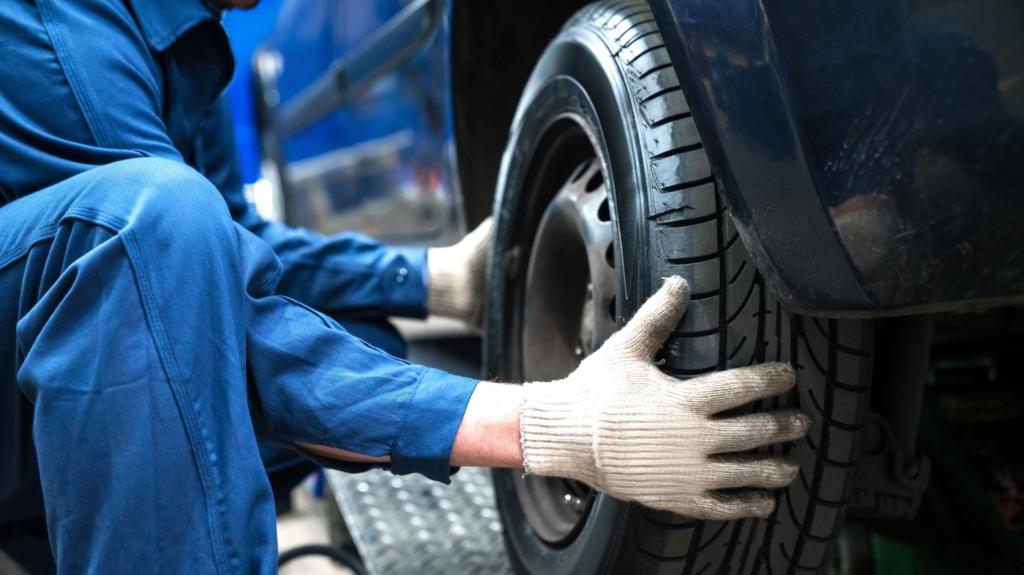“`html
Following a BBC investigation revealing the export of millions of tires to Indian furnaces instead of recycling facilities, the Environment Agency (EA) has announced enhanced checks on tire exports from the UK.
An EA report conceded that it is “highly likely” a portion of exported tires were being diverted to illegal furnace operations.
These rudimentary industrial sites, intended for extracting steel, limited quantities of oil, and other materials, pose significant risks to both human health and the environment.
While welcoming the announcement, campaigners and the tire recycling industry’s representative body have cautioned that the proposed measures may not fully address all loopholes exploited by illicit actors.
The UK generates approximately 50 million waste tires annually, equivalent to nearly 700,000 tonnes. Official data indicates that about half of these are exported to India, ostensibly for recycling purposes.
However, an investigation by BBC File on 4 Investigates and Source Material, a non-profit journalism organization, revealed in March that approximately 70% of tires exported to India from the UK and other nations end up in makeshift industrial plants. There, they undergo a “cooking” process to extract carbon black – a substance used in various industries – as well as steel and oil.
This process, known as pyrolysis, is conducted in facilities resembling homemade pressure cookers, often located in remote areas. It can release toxic gases and chemicals, posing potential dangers to public health and the environment.
In January, an explosion at a processing plant in the western state of Maharashtra, where European-sourced tires were being processed, resulted in the deaths of two women and two children.
A BBC team that visited the site observed soot, dying vegetation, and polluted waterways in the surrounding area, with villagers reporting persistent coughs and eye irritations.
Following the BBC’s exposé on the “cooking” of millions of tires in these plants, the Environment Agency initiated a review, concluding its findings last week.
The review acknowledged for the first time that it is “highly likely” that some tires from the UK are being diverted to illegal pyrolysis operations instead of being properly recycled.
“We have not been able to verify that exported waste pneumatic tires are arriving at their intended destination sites in India,” the EA stated, citing a “lack of sufficiently credible information” regarding proper processing.
The EA emphasized its obligation to prohibit waste exports when there is a risk of environmentally irresponsible management and announced the implementation of enhanced checks on tire exports, effective October 1.
Under the proposed regulations, tire exporters will be required to demonstrate to the EA that waste is being recovered in an environmentally sound manner.
However, the pressure group Fighting Dirty, which had threatened legal action against the EA over its perceived “lack of action” on tire exports, expressed concern that the proposals lack sufficient detail to effectively close loopholes exploited by criminals.
Georgia Elliott-Smith, the group’s founder, stated that while the plan “sounds promising,” it appears to be based on self-certification paperwork and the threat of inspections, a system “not much different from today’s flawed protocol.”
“Only time will tell if this results in meaningful change, or just more red tape and delay,” she added.
The Tyre Recycling Association (TRA), which has long advocated for a ban on whole tire exports, an approach adopted by the Australian government, voiced its “very disappointed” that the EA dismissed this idea.
The TRA believes that tires should only be exported after shredding, which it contends would make illicit sales in India more expensive and difficult.
“Yet again, the EA is failing us as well as themselves,” the TRA said.
The EA defended the new regulations as a “pragmatic solution” that will allow waste tire exports to India to continue, provided that exporters can demonstrate that the tires are being sent to facilities with standards broadly equivalent to those in the UK.
Get our flagship newsletter with all the headlines you need to start the day. Sign up here.
Rotherham Council says it is suspending brown bin collections for the rest of August.
Experts say the US’s sweeping tariffs will slow down the Indian economy if Delhi fails to secure a deal.
India, which now faces among the highest tariff rates imposed by the US, called the levy “unjustified and unreasonable”.
Trump’s tariff threats and social media outbursts have raised concerns about the state of India-US relations.
Many rescue teams have been unable to reach the area because of damaged roads and bad weather.
“`

